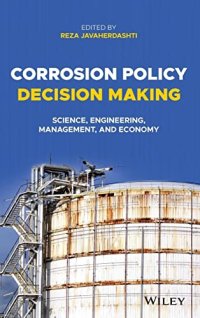
Ebook: Corrosion Policy Decision Making: Science, Engineering, Management, and Economy
Author: Reza Javaherdashti
- Genre: Technique // Construction
- Year: 2021
- Publisher: Wiley
- City: Hoboken
- Language: English
- pdf
Explore the science, management, economy, ecology, and engineering of corrosion management and prevention
In Corrosion Policy Decision Making, distinguished consultant and corrosion expert Dr. Reza Javaherdashti delivers an insightful overview of the fundamental principles of corrosion with a strong focus on the applicability of corrosion theory to industrial practice. The authors demonstrate various aspects of smart corrosion management and persuasively make the case that there is a real difference between corrosion management and corrosion knowledge management.
The book contains seven chapters that each focuses on one important aspect of corrosion and corrosion management.
Corrosion management is an issue that is not just corrosion science or corrosion engineering but rather a combination of both elements. To cover this paradoxical aspect of corrosion management, chapter 2 deals with some basic, introductory concepts and principles of corrosion and coating/painting (an important corrosion protection method) while chapter 3 explains the elements of smart corrosion management in detail. Another important principle of smart corrosion management is to be able to study the cost of corrosion, chapter 4 introduces important points in the economics involved in a smart corrosion management. As indicated earlier, corrosion engineering is also an integral part of corrosion management and thus chapter 5 looks at the engineering side of corrosion by detailing the example of Process Additives (EMPA). Chapter 6 for the first time looks at the possibility of using TRIZ (algorithm of invention) in corrosion management. Finally, chapter 7 presents the necessary elements for building a model that would explore the mutual interaction between corrosion and environment mainly by exploring the difference between environmental impact and environmental effect. Chapter 7 is also very important because the four models so far applied to estimate the cost of corrosion (Uhlig Method, Hoar Method, I/O method and LCC method) are not capable of suggesting any clear model or a sensible way of exploring the elements necessary to explain the impact of indirect costs of corrosion the most important of which being environmental damages imposed by corrosion.
This book is ideal for engineers, students, and managers working or studying corrosion, Corrosion Policy Decision Making is also an indispensable resource for professionals in the fields of upstream and downstream, on-shore/off-shore oil and gas, transportation, mining, power generation as well as major sectors of other strategic industries.